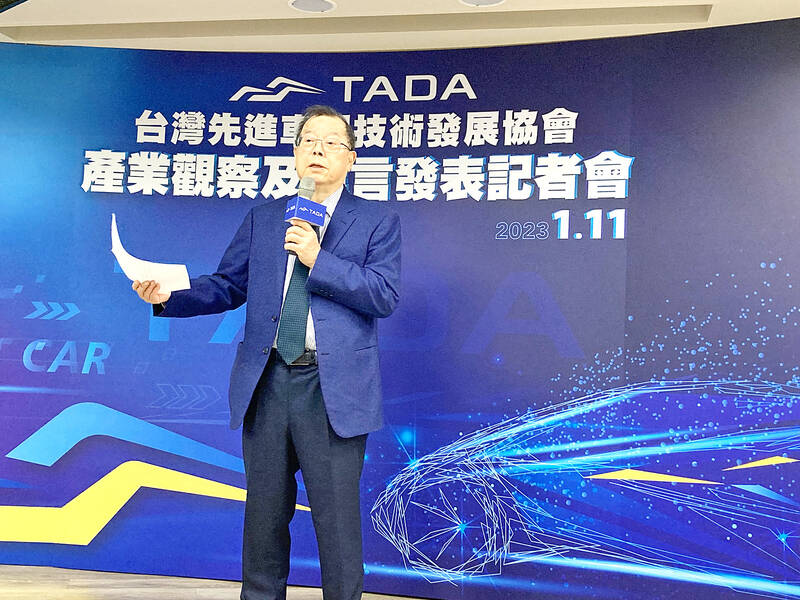Powerchip Semiconductor Manufacturing Corp (力積電) is in preliminary talks with multiple Indian conglomerates to help build new chip plants in the country, it said yesterday, as India subsidizes local chip capacity buildup.
The statement from the maker of memory chips and power management ICs confirmed speculation in the past six months that it was looking to invest in India to diversify its operations amid mounting geopolitical tension.
The company was following similar moves by Taiwan Semiconductor Manufacturing Co (TSMC, 台積電), United Microelectronics Co (聯電) and Hon Hai Precision Industry Co (鴻海精密).

Photo: Lisa Wang, Taipei Times
Tata Group was reportedly one of the possible partners in talks with Powerchip over building a semiconductor fab. Powerchip declined to disclose which companies it is in discussions with.
It is becoming a trend for Taiwanese semiconductor firms to expand operations globally, after TSMC announced its first US semiconductor investment plan, worth US$40 billion, Powerchip said.
“Local semiconductor companies now have to think more seriously about globalization than before,” Powerchip chairman Frank Huang (黃崇仁) told reporters on the sidelines of a news conference in Taipei arranged by Taiwan Advanced Automotive Technology Development Association.
“We are preparing to sign an agreement with India to help it build a plant. It is determined to build one. We are trying to figure out how to support them since we have had similar experience in China,” Huang said.
As India imposes high import duties on semiconductor, it is more cost effective for Indian firms to build a local chip plant, he said.
Powerchip’s parent company, Powerchip Investment Holding Corp (力晶創新投資控股), in October 2015 formed Nexchip Semiconductor Corp (晶合集成) with the Sichuan provincial government to build and operate a fab in Chengdu, China.
Nexchip makes less-advanced chips such as display driver ICs using 150-nanometer and 90-nanometer processes.
Powerchip Investment Holding owns about 27.44 percent of Nexchip Semiconductor shares and a 23.49 stake in Powerchip Semiconductor.
As the talks in India are in the initial stage, Powerchip said it is unclear what role the company would play — as a technology supporter or an equity investor of a joint venture.
US-China trade disputes are positively affecting Taiwanese manufacturers, as Chinese firms and US companies with operations in China are looking for a second source to prevent their shipments from being blocked by Washington, Huang said.
“Taiwan is the best provider of a second source,” he said.
He said he expects Powerchip’s business to start to rebound in the second half of this year, after major supply chain inventory adjustments end following COVID-19 disruptions.
Some notebook computers are still in the process of digesting excessive inventory, he said.
“The first quarter will be the bottom,” he said.
Powerchip said it is cutting factory utilization to cope with sluggish demand, but its loading rate is not as low as some chipmakers that halved production in an attempt to weather the downturn.
The company said it is also facing delays of about six months in ramping up a new 12-inch plant, dubbed the P5 fab, in Miaoli County’s Tongluo Science Park (銅鑼科學園區) due to an extended lead time for semiconductor manufacturing equipment.

NEW IDENTITY: Known for its software, India has expanded into hardware, with its semiconductor industry growing from US$38bn in 2023 to US$45bn to US$50bn India on Saturday inaugurated its first semiconductor assembly and test facility, a milestone in the government’s push to reduce dependence on foreign chipmakers and stake a claim in a sector dominated by China. Indian Prime Minister Narendra Modi opened US firm Micron Technology Inc’s semiconductor assembly, test and packaging unit in his home state of Gujarat, hailing the “dawn of a new era” for India’s technology ambitions. “When young Indians look back in the future, they will see this decade as the turning point in our tech future,” Modi told the event, which was broadcast on his YouTube channel. The plant would convert

‘SEISMIC SHIFT’: The researcher forecast there would be about 1.1 billion mobile shipments this year, down from 1.26 billion the prior year and erasing years of gains The global smartphone market is expected to contract 12.9 percent this year due to the unprecedented memorychip shortage, marking “a crisis like no other,” researcher International Data Corp (IDC) said. The new forecast, a dramatic revision down from earlier estimates, gives the latest accounting of the ongoing memory crunch that is affecting every corner of the electronics industry. The demand for advanced memory to power artificial intelligence (AI) tasks has drained global supply until well into next year and jeopardizes the business model of many smartphone makers. IDC forecast about 1.1 billion mobile shipments this year, down from 1.26 billion the prior

People stand in a Pokemon store in Tokyo on Thursday. One of the world highest-grossing franchises is celebrated its 30th anniversary yesterday.

Zimbabwe’s ban on raw lithium exports is forcing Chinese miners to rethink their strategy, speeding up plans to process the metal locally instead of shipping it to China’s vast rechargeable battery industry. The country is Africa’s largest lithium producer and has one of the world’s largest reserves, according to the US Geological Survey (USGS). Zimbabwe already banned the export of lithium ore in 2022 and last year announced it would halt exports of lithium concentrates from January next year. However, on Wednesday it imposed the ban with immediate effect, leaving unclear what the lithium mining sector would do in the